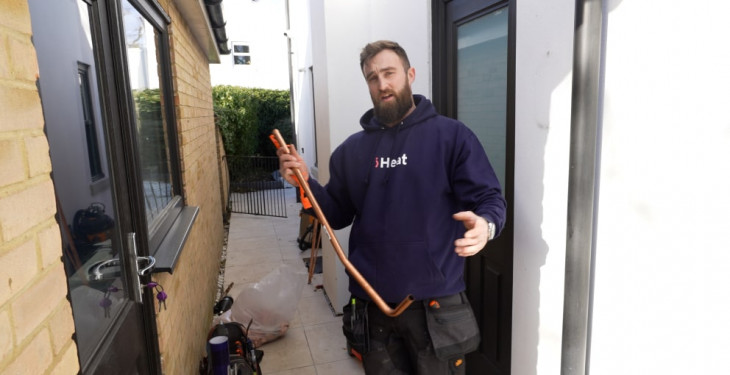

Written by Stephen Day
Gas Safe Engineer
Updated: 30th May, 2025
Any time a boiler error code presents itself it can be anxiety and stress inducing, but fear not, at iHeat we want you to be as informed as possible.
Get a new boiler quote, save up to £550 per year (0% APR available).
In this blog we’ll be taking a look at the Vaillant F24 error code including its meaning as well as its causes, and how it can be fixed.
An error (fault) code is an alphanumeric code displayed when a boiler isn’t functioning as it should. The code booth alerts the owner something is wrong and informs them of the type of issue occurring.
By identifying the specific error code, homeowners and heating engineers can quickly diagnose the issue and take the appropriate steps to fix it.
The F24 error code displayed by Vaillant boiler models is an indication that the water is not flowing properly through the pipework of your heating system.
When this occurs, the boiler will lockout or shut down as a safety measure and to protect its functionality, while displaying the F24 code.
As water is a crucial component in a heating system, it is responsible for heating up the radiators and providing hot water for various uses, such as showering. Therefore, the F24 fault code suggests that there is either no water flowing through the heating system or very little water flow.
This issue can lead to a malfunctioning heating system, preventing it from providing heat and hot water to your home.
There are several potential reasons why there may be a lack of water circulation in your heating system, leading to the F24 error code:
One of the most common reasons for this issue is a faulty pump. Blockages are often caused by debris in the pump, leading to a cease in operation or seized components, incorrect speed settings, or other reasons that may cause pump components to falter.
If your boiler was recently serviced, it's possible that if carried out by a non professional the isolation valves were mistakenly left in a closed position. This can obviously prevent water from circulating as it should, resulting in the F24 error code.
The presence of trapped air (airlocks) in the heating system can slow or even stop water flow, leading to the F24 code.
A less frequent cause of the F24 fault is if there is an issue with the wiring that connects the pump and PCB. This may be a false flag as an F24 error code may be displayed without any water flow problems actually happening.
Resolving a Vaillant F24 error code depends on the cause of the issue.
If the error was caused by closed isolation valves, simply opening the valves should fix the problem.
However, if the issue is with the PCB, it may need to be replaced, which can be costly, around £510. In such cases, it may be more cost-effective to replace the boiler entirely with a new model.
Airlocks can be resolved by applying pressure to the affected areas, such as the pump, radiators, or towel rails in your home. A professional can inspect and offer advice on cleaning or replacing damaged parts.
While fixing the isolation valves is a task that can be accomplished by homeowners, other issues may require professional assistance. For example, if the pump has become stuck due to debris, a professional should be contacted.
If you suspect an airlock is causing the issue, you can attempt to manually bleed it. To do this, close the gate valves to stop water from entering, then slowly loosen the bleed screw.
As the air escapes, it will produce a hissing sound and be replaced by a small amount of liquid water. Open the gate valves at the ends of your boiler and restore water flow and flush all radiators as a precautionary measure.

Arranging for your boiler to be annually checked over or ‘serviced’ by a qualified engineer can be a fantastic way of analysing the state of your heating system in yearly increments, identifying and rectifying any faults before they have a chance to progress.
While an individual component such as a pump or sensor can be replaced in isolation, if your boiler is starting to show signs of more serious or repeat decay, it may be beneficial to upgrade to a newer, more efficient boiler.
The best way of ensuring your boiler is operating as it should, is by proactively replacing ageing or faulty boilers at the earliest signs of degradation, this preventative step is far more prudent than reactive maintenance.
It’s a mechanical and engineering fact that due to some of the technological advancements in recent times, modern boilers are more robust and efficient than anything made previously.
Last updated: 30th May, 2025

Written by Stephen Day
Gas Safe Engineer at iHeat
Stephen Day is a Gas Safe registered and FGAS certified engineer with over 20 years of hands-on experience in the heating, cooling, and renewable energy industry, specialising in boiler installations, air conditioning, and heat pump systems.
LinkedInArticles by Stephen Day are reviewed by iHeat’s technical team to ensure accuracy and reliability.

13th February, 2026
Boiler energy efficiency refers to how well a boiler uses its fuel to generate heat. This...
 Read Article
Read Article

12th February, 2026
This Valentine’s Day we want to let you in on a dirty little secret…
 Read Article
Read Article

12th February, 2026
In this guide, we’ll be answering some of the most frequently asked questions about what h...
 Read Article
Read Article
No obligation. Takes less than 60 seconds.